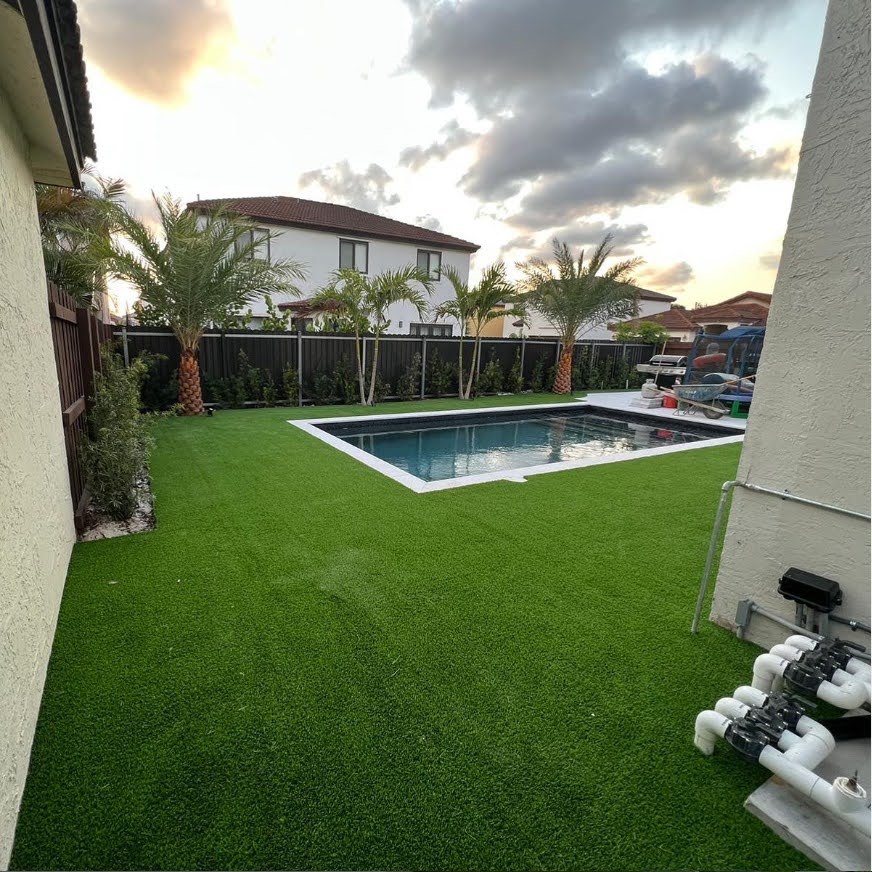As more homeowners look for eco-friendly alternatives to natural grass, synthetic turf has become a popular choice for landscaping. However, one common question arises: Is synthetic turf environmentally safe? In this blog post, we’ll explore the environmental impact of synthetic turf, its eco-friendly benefits, and how it compares to natural grass when it comes to sustainability.
1. Water Conservation and Synthetic Turf
One of the most significant environmental benefits of synthetic turf is its ability to conserve water. Traditional lawns require extensive watering to stay green, especially in regions with hot or dry climates. With synthetic turf, homeowners can dramatically reduce their water consumption since it doesn’t require irrigation. This is particularly important in drought-prone areas where water restrictions are in place, and every drop counts.
By switching to synthetic turf, you can eliminate the need for regular watering, saving thousands of gallons of water each year. If you’re searching for ways to reduce water usage, consider looking into water-saving synthetic turf installation to help preserve this valuable resource while maintaining a lush, green lawn.
2. Elimination of Pesticides and Chemical Use
A major advantage of synthetic turf over natural grass is the elimination of harmful chemicals. Traditional lawns often require pesticides, herbicides, and fertilizers to control weeds and pests and keep the grass healthy. These chemicals can have negative impacts on local ecosystems, contaminate water supplies, and even pose health risks to humans and pets.
Synthetic turf provides an eco-friendly alternative by eliminating the need for these toxic substances. Homeowners who prioritize environmental safety can benefit from chemical-free synthetic turf for eco-conscious lawns, ensuring their outdoor spaces remain safe for children, pets, and local wildlife.
3. Recyclable and Sustainable Materials
Many synthetic turf products are now made with environmentally friendly, recyclable materials. Manufacturers are increasingly focused on producing turf that is durable, long-lasting, and made from sustainable sources. When synthetic turf reaches the end of its lifespan, it can often be recycled, reducing landfill waste and promoting a more sustainable product lifecycle.
When choosing synthetic turf for your home, it’s essential to consider the materials used in the manufacturing process. Opt for recyclable synthetic turf products to ensure that your lawn is not only functional and attractive but also eco-friendly.
4. Reducing Carbon Emissions
Another environmental benefit of synthetic turf is its ability to reduce carbon emissions. Traditional lawn maintenance, such as mowing and trimming, often relies on gas-powered equipment, contributing to air pollution and carbon emissions. By installing synthetic turf, you can eliminate the need for regular mowing, reducing your home’s carbon footprint.
In addition to reducing emissions from lawn care equipment, synthetic turf also eliminates the need for chemical treatments that produce harmful pollutants. Homeowners interested in reducing their environmental impact can explore carbon-reducing synthetic turf options to create a more sustainable and eco-conscious outdoor space.
Is Synthetic Turf the Environmentally Safe Choice for Your Home?
The environmental impact of synthetic turf has improved significantly over the years, making it a viable and eco-friendly option for many homeowners. From water conservation and reduced chemical use to the use of recyclable materials and lower carbon emissions, synthetic turf offers several benefits that contribute to a greener, more sustainable environment.
If you’re considering making the switch to synthetic turf, it’s essential to choose products that prioritize sustainability and environmental safety. Search for environmentally safe synthetic turf for residential lawns to find the best options for your home. By investing in synthetic turf, you can enjoy a beautiful, low-maintenance lawn while contributing to environmental conservation efforts.
While synthetic turf may not be a perfect solution for every situation, its eco-friendly benefits make it an attractive option for homeowners looking to reduce their environmental impact. Whether you’re concerned about water usage, chemical runoff, or carbon emissions, synthetic turf can be an environmentally safe and sustainable choice for your landscaping needs.

synthetic turf install

Recent Comments